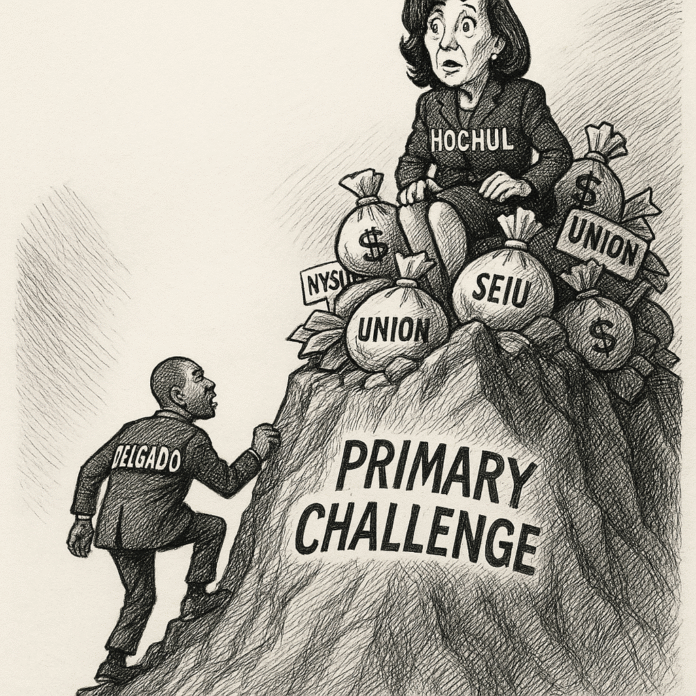NY Political Tremors: Delgado to Challenge Hochul in Governor Race
A Brewing Storm in Albany: Lieutenant Governor’s Bold Move Sets Stage for Democratic Primary Showdown
New York’s political landscape is bracing for a significant shakeup. Lieutenant Governor Antonio Delgado is reportedly poised to announce a primary challenge against incumbent Governor Kathy Hochul this week. This move ignites a high-stakes battle within the Democratic party, pitting a once-aligned running mate against the state’s current leader. The challenge comes on the heels of a very public and increasingly acrimonious split between the two, culminating in Delgado being stripped of key state privileges, including his office space and official email access – a clear signal of the deep rift that has formed.
The path for Delgado is undeniably steep. Governor Hochul commands a formidable $15 million campaign war chest and enjoys robust support from powerful unions and influential special interest groups. Furthermore, her existing incumbency grants her a significant advantage in voter name recognition across the Empire State. However, Delgado’s decision to run, even in the face of these obstacles, suggests he perceives a vulnerability or a significant policy divergence that resonates with a segment of the Democratic electorate.
The Deepening Divide: From Allies to Adversaries
The news of Lieutenant Governor Antonio Delgado’s impending primary challenge against Governor Kathy Hochul transforms months of speculation into a concrete political contest. The “notable public disputes” cited as the precursor to Delgado’s loss of state privileges hint at a fundamental breakdown in their working relationship. While the specifics of these disputes remain to be fully aired, the consequences – removal from office space and official email – paint a picture of a partnership that has irrevocably fractured.
For Delgado, this move is a high-risk, high-reward endeavor. Challenging a sitting governor from one’s own party, especially one who initially brought him onto the statewide ticket, is a bold and perilous path. It signals a belief that Hochul’s leadership is either out of step with the party’s base or that there’s a compelling alternative vision he can offer New Yorkers. This sets the stage for a primary that could expose fissures within the state’s Democratic party, forcing voters to choose between established leadership and a new direction.
Hochul’s Fortress: Funding, Endorsements, and Recognition
Governor Hochul enters this intra-party fray with significant advantages. A campaign fund reportedly standing at $15 million provides her with the resources to mount a vigorous defense of her record and to define her opponent early on. Money in politics is not just about spending; it’s also a signal of support and viability.
Beyond financial muscle, Hochul’s backing from “strong union and special interest support” is a critical asset. Union endorsements often bring not only financial contributions but also organizational strength – volunteers, get-out-the-vote efforts, and a communication channel to thousands of engaged members. Special interest groups, similarly, can mobilize their members and advocate on her behalf.
Perhaps most crucially, as the incumbent governor, Hochul possesses widespread name recognition. In a sprawling and diverse state like New York, simply being known to voters is a massive hurdle that any challenger must overcome. Delgado, while Lieutenant Governor, generally has a lower public profile than the chief executive, a fact reflected in early polling.
The Uphill Battle: Polls and a New Electoral Hurdle
The numbers, at this initial stage, underscore the magnitude of Delgado’s task. A Siena College poll offers a stark snapshot: Hochul leads with 46% support among Democratic voters, while Delgado registers at 12%. This wide gap highlights the substantial ground Delgado needs to cover. The same poll indicated that Bronx Representative Ritchie Torres is also considering a future bid, though his immediate intentions regarding this specific primary are not yet clear. The presence of other potential or speculative candidates can further complicate the electoral math.
Adding a significant layer of complexity to Delgado’s challenge is a new election law. This reform mandates that candidates for governor and lieutenant governor run as a joint ticket in primary elections. Previously, candidates for these two offices ran separately in primaries, only joining forces for the general election. This change, ironically, could have been seen as a measure to ensure a more harmonious executive team. However, in this context, it means Delgado cannot simply run for governor; he would need to select a running mate for lieutenant governor, and they would campaign as a pair from the outset of the primary. This forces him to build a broader coalition and present a more complete vision of his potential administration much earlier in the process. For Hochul, it means she too will need to solidify her partnership with a chosen running mate for the primary contest.
This new joint-ticket rule makes a primary challenge like Delgado’s particularly intricate. It’s no longer just an individual challenging another; it’s one potential executive team vying against the incumbent team (assuming Hochul selects a new de facto running mate if Delgado is challenging her). This could make it harder for a challenger to focus solely on the perceived weaknesses of the governor, as their own choice of a running mate will also come under scrutiny.
What This Means for New York Democrats
Delgado’s challenge, despite the long odds suggested by early polling and Hochul’s established advantages, signals a potentially contentious period for New York Democrats. Primary battles can be healthy for a party, forcing debates on policy and direction. They can also be divisive, leaving scars that can impact unity in a subsequent general election.
For a center-left audience, this contest will likely raise important questions:
- Policy Differences: What are the substantive policy disagreements that led to this public fissure and challenge? Will this primary focus on nuances of progressive policy, or will it be driven more by personality and leadership style?
- Party Direction: Does Delgado represent a more progressive wing of the party, or is he appealing to a different coalition of voters? How will this challenge shape the future direction of the Democratic Party in New York?
- Accountability and Governance: The circumstances of the split, including the removal of Delgado’s privileges, will likely be scrutinized. What does this say about the current administration’s approach to dissent or internal disagreement?
The narrative of a lieutenant governor taking on the governor they served under is inherently dramatic. It suggests a level of conviction on Delgado’s part that the current trajectory needs correction. He will need to articulate a compelling case for why a change is necessary and why he is the one to lead it, especially given Hochul’s financial and institutional backing.
The Path Forward: A Call for Engagement
As this primary battle unfolds, it will be crucial for New Yorkers to look beyond the political maneuvering and focus on the substance. The state faces numerous challenges, from economic recovery and affordability to public safety and infrastructure. This primary should be an opportunity for a robust debate about the best way to address these issues.
Delgado’s announcement, once formalized, will fire the starting gun on what promises to be a closely watched race. His ability to raise significant funds, garner grassroots support, and effectively communicate his message will determine if he can transform his current 12% standing into a viable challenge. Governor Hochul, on the other hand, will need to leverage her incumbency and resources to consolidate her support and fend off what could become a distracting and draining internal fight.
The coming months will reveal the true nature of this challenge and its potential to reshape New York’s political leadership. For voters, particularly those who identify as center-left, this is a moment to engage, to question, and to demand accountability. The health of our democracy relies on contested elections and informed participation. Stay informed, scrutinize the candidates’ platforms, and prepare to make your voice heard. This is not just about who holds office; it’s about the future direction of New York State.




